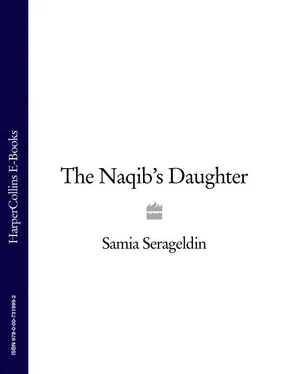He reached the bank and unbuckled his belt and removed his scabbard and the pistols tucked into his sash; the firearms would be useless once wet. He took off his tunic and his soft leather boots, all his clothing but his shirt and pantaloons. He unwound his turban and ripped off strips of it to bandage the wounds on his head and hand and thigh. He removed his rings, the other jewels on his person, and his dagger, wrapping them carefully in the folds of the remaining length of his turban and tying the ends around his middle. Then, taking a deep breath, he slid into the water as smoothly as a crocodile.
His only chance would be to swim downriver and resurface as far from the scavengers as possible; assuming he could avoid being shot out of the water by snipers on the banks, or being caught in the floating flames. He was less concerned about crocodiles this far downriver. Elfi took another deep breath and filled his lungs. Perhaps, he thought, some alignment of his stars had kept him practising the art of holding his breath underwater for as long as a hawk took to circle seven times. The time had come when he would be tested. He plunged further into the black water.
From the city beyond the flames a terrible wailing rose in the smoky air and rolled across the water like thunder.
Zeinab’s fingers trembled so much she couldn’t manage to hook the loops around the gold-braid buttons of her tunic. Her wet-nurse was having almost as much trouble trying to dress Zeinab’s younger brother, who was whining and snivelling into his nightshirt; he had been asleep when the nurse had come into their room in the middle of the night. Zeinab herself had been wide-eyed, kept wakeful by the sound of the cannons in the distance, and then, even more terrifying, the wailing as the people of Bulaq and the bank of the Nile surged towards the city.
‘God preserve us, God preserve us!’ the nurse repeated. ‘Sitt Zeinab, hurry! They say the French have set fire to Bulaq and that the vanguard has reached the Iron Gate! They say they are burning and killing and raping women! God only knows. Your father says we must leave, we must leave right away. He is trying to find donkeys for us, but every donkey and horse in the city has already been commandeered. What will become of us?’
By dawn donkeys had been bought, at an exorbitant price, to carry Zeinab and her mother and youngest brother; the men and the servant girls would have to walk. Shaykh Bakri had stayed behind, heading for the Azhar where the ulema had congregated.
Zeinab looked around her as they tried to thread their way through the thronged streets; it seemed as if all the citizens of Cairo were on the move, most on foot, carrying what they could. As their slow procession approached the outer gates of the city they were met by a terrible sight: people returning, wailing, bloody, half-naked, the women tearing their hair and screaming: ‘The Bedouin! The Bedouin! They fell upon us as soon as we left the city walls. Turn back! Turn back!’
‘Bring me my jewellery coffer.’
‘Sitt Nafisa?’ Fatoum looked up from brushing Nafisa’s hair. The maid’s consternation was apparent. ‘Shouldn’t we be hiding the jewellery?’
‘No, fetch it as soon as you finish dressing me.’ If she was to meet the emissary of the French, she wanted to inspire respect for who she was: Murad’s wife and Ali’s widow. Human nature being universal, she knew that an appeal to esteem and cupidity would be a more reliable card than appealing to pity. But what cards were left for her to play in the face of this overwhelming defeat? Her mind buzzed like a trapped bee. What would the French exact of her? How did they mean to deal with her and with the wives and children of the amirs? The worst fears of the city had been laid to rest the morning after the battle when it transpired that the French had not burned and pillaged the eastern shore; it was the fire on the ships that had given rise to that rumour.
But where was Murad? She made an effort to concentrate on her dressing. She stepped into the rose pantaloons Fatoum held out for her, then slipped the embroidered violet tunic over her sheer white chemise and let the girl tie a rose-and-gold sash round her waist, cinching it in. Nafisa smoothed her thick braid over one shoulder and fixed a small toque on her head, then let a filmy veil float down over it.
‘Sitt Nafisa, the jewellery.’
‘Let me see.’
She rifled through the tooled leather casket the maid held before her, selecting two thick ropes of pearls and winding them around her neck. She picked two ruby drop-earrings and threaded the fine gold hoops through her earlobes, then slipped the matching bracelet and ring on one hand, and an emerald-and-diamond bracelet on the other wrist. She hesitated, then carefully took a large yellow diamond ring out of a velvet pouch and slipped it on her middle finger; it was as big as a pigeon’s egg and sparkled like the sun reflecting off ice.
She wondered if the looters who had raided Murad’s house in Qawsun had found the coffer her eunuch had hidden under the planks of the second-floor loggia. Ibrahim Bey’s house in Qawsun had been raided too, and several houses belonging to the other amirs, abandoned in their rout.
She had had no word from Murad, but he was alive, that much she knew. The servants on their estate in Giza had reported that their master had appeared and disappeared like a whirlwind, dismounting barely long enough to snatch up the coffers of treasure hidden for that eventuality – and then he was gone.
For the last time, but not the first, she allowed herself a moment of regret. Regret that Murad had not turned out to be the worthy heir of Ali Bey the Great that she had hoped he would become, with her help, when she married him. Seeing in Murad an energetic, domineering temperament that brooked no rival, she had chosen him for a mate. But his instinct to dominate others was not matched by the ability or the judgment to govern them. In their years together, she had learned to handle him with the finesse of a spider weaving a web, but he was ever conscious of the long shadow of Ali Bey. Sensing that he did not measure up to her first husband, he became bitter and intractable, resentful of her interference.
Shaking off that final moment of regret, Nafisa got to her feet. The emissary of the French was at her door. General Bonaparte had sent his own stepson, Eugène de Beauharnais, as a gesture of goodwill.
With as convincing a show of calm as she could muster, Nafisa waited for him to come up to the second floor reception hall. She had ordered the finest Bukhara carpets laid on the stone floor and the most sumptuous, gold-embroidered silk pillows spread over the wooden banquettes. Within a few moments she heard a springy step on the staircase; her first impression was of a smooth-cheeked boy in skin-tight breeches and a short, close-fitting blue coat. He hesitated for no more than a moment before advancing towards her.
‘Madame.’ He gave a crisp bow. ‘Eugène de Beauharnais, delighted to make your acquaintance.’
She inclined her head in acknowledgement, momentarily disconcerted by the sight of the man who had followed Beauharnais up the stairs: Bartholomew – or Fart Rumman, ‘pomegranate seed’, as people called him derisively in the street. She was astonished at his appearance: he wore a fur stole, a preposterous plumed red silk hat, and a new air of presumption. A Greek mercenary known for his dishonesty and brutality, he had been a simple artillery man of Elfi’s who made money on the side selling glass bottles in the souk. That the French had been ill-advised enough to choose a man of such low standing and unsavoury reputation for translator or agent did not bode well. Behind Bartholomew, her chief eunuch Barquq had taken up his post by the door, arms crossed, his expression unreadable.
Читать дальше












